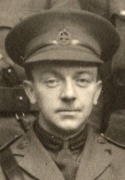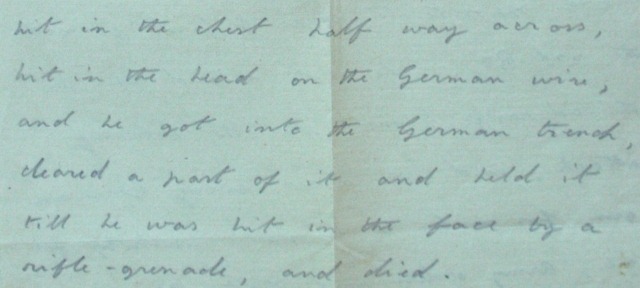
For the attack on Serre on the opening day of the Somme offensive, Livesey led the second wave of the battalion, comprising two platoons each of W and X Companies. In the early hours of 1st July 1916, the four platoons deployed in Copse Trench, some 50-70 yds behind the front line. At 7.22am, Livesey - walking stick in one hand, revolver in the other - led his men into No Man's Land where they lay down on the ground 50 yds behind the first wave. At 7.30am, as the British artillery bombardment lifted from the German front line, Livesey and his men clambered to their feet and followed the first wave forward. Machine gun and artillery fire quickly wrought havoc throughout the advancing lines of men. Capt. Arnold Tough, leading the first wave, was killed within minutes leaving Livesey to lead the shattered remnants of the first two waves. Along with a handful of men, Livesey found a way through the wire entanglements and into the German front line. Exactly what happened in the following minutes is largely unknown. Livesey's orderly, Pte. Clarence Glover, described how the group was faced by five Germans coming round a corner, the first of whom threw a bomb which grazed Livesey's face. Livesey returned fire with his revolver, killing all five of the enemy. The group held on desperately, bombing the Germans back until their bombs were exhausted. The last he saw of Livesey was when, while attempting to return to the British lines, the pair made for a shell hole as another shell exploded nearby. Lt. Gerry Gorst who, as Livesey's 2nd-in-command had been held out of the attack on Army orders, described the story differently when writing to his sister on 10th July: "Livesey, who commanded [my Company], will I believe be recommended for the V.C.; a very gallant officer, he was hit in the arm getting over the parapet, hit in the chest half way across, hit in the head on the German wire, and he got into the German trench, cleared a part of it and held it till he was hit in the face by a rifle-grenade, and died."
Above: Extract from a letter written by Lt. Gerry Gorst to his sister, Betty, on 10th July 1916. The extract appears here with the kind permission of Gerry's son, John Gorst. A telegram dated 7th July from the War Office Secretary to Livesey's father read "Regret to inform you that Capt. H. Livesey East Lancashire Regt. was wounded 1st July. Details will follow when received". Any hope that the family had of seeing Harry Livesey again was extinguished by the arrival of a further telegram sent 7 days later: "Deeply regret to inform you that Capt. H. Livesey East Lancashire Regt. previously reported wounded July 1st now reported killed. The Army Council expresses their sympathy". In a letter to Livesey's father, Lt.-Col. Arthur Rickman wrote: "I cannot express to you my deep sympathy in the loss of a dear friend and a splendid example of a man who carried out his duties no matter how irksome or how dangerous, with that spirit and gallantry which the country and the army so deeply admire. I cannot express a tithe of what I feel at his loss. Always cheerful, always keen on his work, his one great object was to do his duty and further the cause of his country. In him the country has lost a fine soldier, a splendid example of courage and discipline." Harry Livesey has no known grave and is commemorated on the Thiepval Memorial. © Andrew C Jackson 1998, 1999, 2008 Compiled from TNA documents WO339/16461 and WO95/2366, CWGC records, the Quarterly Army List for June 1916, the Accrington Observer & Times of 11th and 22nd July 1916, "Accrington Pals" by William Turner, the 1891 Census for England and Wales, and with the kind help of John Gorst.
|

